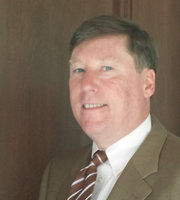Feeney unopposed in District 28
GUILDERLAND — Incumbent Democrat Dennis Feeney is a lawyer who has lived in Guilderland “pretty much my whole life,” he said, except when away at college and law school. He has represented District 28 since 2011 and has been majority leader since April 2018.
He is unopposed. L-shaped District 28 covers from an area from around East Lydius Street and the entrance to I-90 in the northwest to Willow Street and Route 155 on the southeast.
His partner at Feeney and Centi is Daniel Centi, husband of Guilderland town councilwoman Rosemary Centi. Feeney’s brother, Stephen Feeney, is chairman of Guilderland’s planning board; the members of the planning board are appointed by the town board.
Feeney is the first vice chair of the Guilderland Democratic Party.
He also represented District 30 in the legislature from 2004 through 2007, when he lived on Leto Road in Westmere; he later moved to District 28.
He grew up near the end of Willow Street, he said, and now lives on Feeney Lane, off Dedham Post Road.
He was counsel to the Albany County Industrial Development Agency for a number of years, and also served at one point as special counsel to the Guilderland water district. He was not an employee of the town, he said, but did legal work as it became necessary, for instance when water extensions were being done.
He commends Sheriff Craig Apple for proposing the program involving transitional housing for the homeless in a special section of Albany County’s jail that is currently unused.
“It makes sense,” he said, “when we have all the empty space at the jail, to use it for something purposeful, and I think it’s a great idea.”
He added, “I hope they’re able to get the grants, and it’s successful.”
Feeney added that he believes the county does currently distribute monies to a lot of organizations that help the homeless. After the interview, he sent The Enterprise a list of homeless shelters that have contracts with Albany County to provide services.
“It’s challenging,” he said, “but I think we should do whatever we can to help that situation.”
He would need to look into Enterprise questions related to emergency medical services, he said.
“I don’t really have a full grasp of what the numbers would be,” he said.
“I'm hoping we can work with the municipalities that need those services, to provide those services,” Feeney said, “but in a fiscally responsible manner.”
He would like to look at the numbers, to see what he thinks is fair. “But obviously you have to have that type of coverage,” he concluded.
Feeney supports the ban on plastic stirrers and straws, but said it might be better to start with a more gradual change, in which customers don’t get a plastic straw or stirrer unless they ask for it.
“I think that might be a better way to start, and then bring it along to maybe an eventual ban,” he said, adding that he voted for the Styrofoam ban.
On green initiatives, Feeney said he knows the county is already working on a number of them.
For instance, he said, there is a study to determine where would be the best county-owned buildings to be outfitted with solar panels or which county-owned parcels could become solar farms.
The county is also working to create a regional anaerobic digester, he said, and has appropriated funds for it. It will be located at the north and south plants of the water purification district, he said, in Menands and Albany.
The digester should have many positive impacts, he said, on waste processing and water purification procedures. The digester will also act as a revenue source, he said, because the county will be able to sell the natural gas it produces.
“It has been in the works for a while but is finally getting going,” he added.
Feeney said he has no problem with the concept of paid sick leave, but he would like to see it enacted at the state, rather than the county level, since a county-based regulation would not be fair to county business, he said, “when businesses in surrounding counties don’t have it.”
As a county-based initiative, he said, he is opposed to it, and he voted against it.
He added that he supports workers’ rights and unions but that having a paid-sick-leave law at the county level isn’t practical. He explained, “I think it makes the county less attractive. It creates some payroll nightmares for businesses that operate across county lines.”
Feeney said that he found the figure quoted by The Enterprise for the percentage of suburban poor in Guilderland “shockingly high.”
Perhaps one main thing the county should do would be to provide more suburban satellite offices of its social-services department, to make it easier for people to access, he said.
With regard to opioids, he said, “I know we have appropriated funding to expand Naloxone access throughout the county.”
He said that, if he knew what to do to solve the problem of opioid addiction, he would be at a higher level.
“The best thing we can do is allocate resources,” he said, “rather than incarcerate.” He applauds the sheriff’s initiative.
At all levels of government, Feeney believes more resources need to be allocated for treatment for those who need it.
“The focus needs to be on people getting treatment,” Feeney said. “We should look into whatever resources we can provide to help people who need treatment.”
Feeney pointed to things he is proud of, naming the legislature’s being “very fiscally responsible” over the last several years with its budgeting; the fact that the county is renovating the nursing home; the millions of dollars the county has spent renovating the Times Union Center, which he said has attracted more acts to come to Albany; and the county’s increased funding to expand the Albany County Rail Trail.
Finally, he said, over the last four years, the county has provided more than $2.5 million in funding to increase the capabilities of the Albany County Land Bank.



